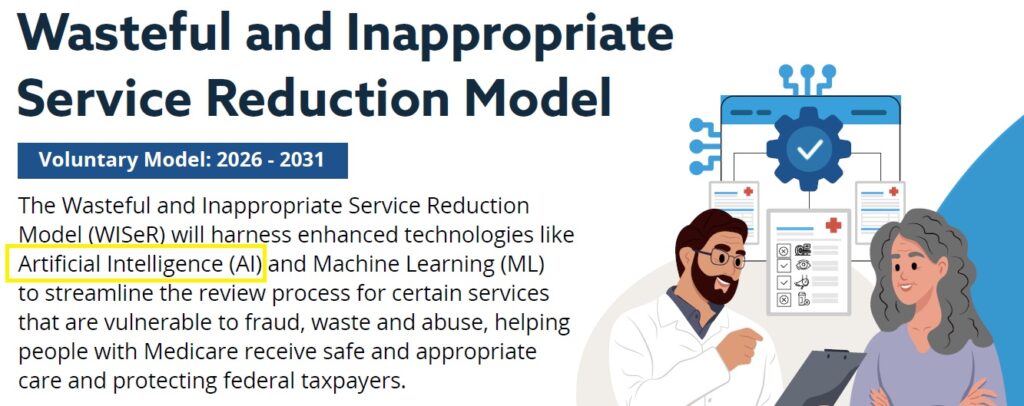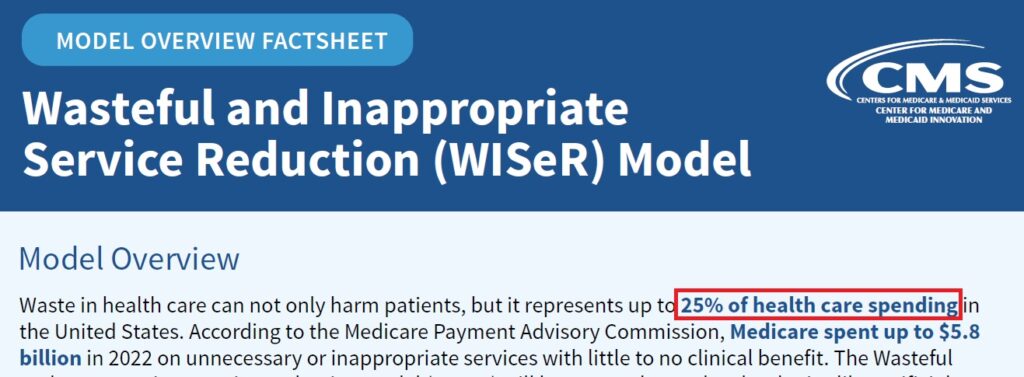The Centers for Medicare and Medicaid Services (CMS) announced they will begin using Artificial Intelligence in 2026 as part of a strategy to approve health care services to Medicare beneficiaries. Dr. Oz has decided to inject AI in between Medicare beneficiaries and their doctors. The focus is reducing wasteful health care services.

Under the leadership of Dr. Oz, Medicare is rushing to implement Artificial Intelligence (AI) to review, authorize, or deny health care services received by Original Medicare beneficiaries. The primary goal is to save money not necessarily improve patient outcomes. CMS calls the new AI health care initiative “Wasteful and Inappropriate Service Reduction (WISeR) Model.

CMS uses a 2019 JAMA (The Journal of the American Medical Association) article[i] stating that 25 to 30 percent of U.S. health care spending is wasteful. However, the JAMA article reviewed all health care services and was not specific to Original Medicare claims. Regardless, Dr. Oz is moving forward assuming that Original Medicare is rife with wasteful health procedures and equipment.
Initially, the WISeR prior authorization of health care services will focus on three categories of services.
- Skin and tissue substitutes
- Electrical nerve stimulators
- Knee arthroscopy for knee osteoarthritis

The AI test will begin in select states where CMS has determined that there appears to be a higher rate of wasteful health care services. The WISeR AI model ONLY applies to individuals in Original Medicare, with or without a Medicare Supplement plan. Individuals in Medicare Advantage plans are not affected.

Doctors and providers will be invited to participate in the prior authorization model. If they opt out of the process, their claims for reimbursement for the specific health care services will go through a claims review. CMS states-
“Participants [doctors] will be rewarded based on the effectiveness of their technology solutions for reducing spending on medically unnecessary or non-covered services. For each selected service, participants will receive a percentage of the reduction in savings that can be attributed to their reduction of wasteful or inappropriate care.”
Providers subject to the AI review will have the option of submitting prior authorization requests or have the health care service claim be subject to post-service/pre-payment medical review. Providers with a good record of compliance could be exempted from the prior authorization procedure and labeled as a ‘gold card’.
The technology companies applying AI to prior authorization for these services will be assigned a state. The WISeR fact sheet states that denials for pre-authorization for one of the health services will be reviewed by a licensed clinician. Of course, the clinician is an employee of the AI technology company whose mission is to save Medicare money which may lead to denial of authorization or claims.

Of course, AI prior authorization has been implemented by many health insurance companies. United Healthcare was sued by members accusing the company that AI improperly denied health care services.
The fear, because Dr. Oz’s goal is to save money, is that this AI review and prior authorization model will be expanded. This small test with AI could be the template to include more health care services across all of the United States. If virtually all Original Medicare services, such as visiting a specialist, need AI approval, how is that any different from a Medicare Advantage HMO plan?
As Trump shrinks the federal government, agencies like Medicare will turn to more private independent contracts to process the work. The introduction of AI into the health care delivery system is not necessarily a bad thing. What is scary is if we turn over health decisions to AI machines, cutting the doctor and patient out of the authorization equation.
YouTube video explainer the AI Medicare experiment.
[i] https://jamanetwork.com/journals/jama/article-abstract/2752664



